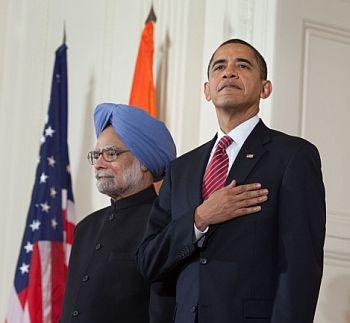 | « Back to article | Print this article |
 Everything was in place. The pomp and circumstance was effective. Atmospherics were right. Nuances had a cadence that would put fiction writers to shame. Stock phrases flowed freely.
Everything was in place. The pomp and circumstance was effective. Atmospherics were right. Nuances had a cadence that would put fiction writers to shame. Stock phrases flowed freely.
US President Barack Obama was effusive in his praise of India, termed Prime Minister Manmohan Singh as a wise leader and described the Indo-US relationship as one of the defining partnerships of the 21st century.
To pacify Indian concerns about its relegation to the status of a regional power, India was described as a "rising and responsible global power."
We were told that US and India cooperation will be strengthened on a whole range of issues from trade, investment, climate change, food security to academic exchanges and intelligence.
Obama also expressed his country's "full and complete commitment" to implement the Indo-US civilian nuclear cooperation agreement.
Yet something was not right.
Where's the beef, one might be tempted to ask. It was extraordinary that Obama had nothing to say about terrorism being inflicted on India from Pakistan, especially as he was speaking two days before the 26/11 anniversary.
It was an opportunity for the Obama administration to demonstrate its commitment to India in getting Pakistan to act on terror masterminds of the dastardly terror attacks in Mumbai. It chose not to.
Though Obama mentioned India as indispensable to the US, it should be more than clear to his Indian interlocutors that it is Pakistan that is indispensable. He skirted the pointed question on Pakistan in the press conference. Instead, he made some bland statements about working towards peace and security for all.
India and the US do not seem like natural partners anymore. The hope in the corridors of power in Washington is that flattery will be enough to erase doubts about this administration's India policy, if indeed it has one.
There will be more platitudes about India's global role and shared values between the two democracies during the remainder of Manmohan Singh's visit. The Indian government has already started declaring what a success this trip has been.
Shashi Tharoor (minister of state for external affairs) is extremely satisfied with the joint statement because it mentions the word "indispensable."
The fact remains, however, that India has little importance for this administration that is mired in a plethora of domestic and foreign policy crises. At a time when everyone and anyone seems to be taking this administration for a ride, New Delhi should cease hoping too much from Washington. It should not get swayed by the rhetoric that is devoid of substance.
If one hoped that Dr Singh's visit would be a step towards clarifying growing doubts about the direction of Indo-US ties, those hopes have been thoroughly belied.
At the regional level, Pakistan will get most of the attention and at the global level, the US cannot be conciliatory towards China. If in the process, Indian interests get sidelined, it is not for the Obama administration to worry about. It is the Indian government's priority to stand firm on its core national interests and to see that those interests are firmly protected.
Image: Prime Minister Manmohan Singh with US President Barack Obama at the East Room of the White House
Photograph: Official White House Photo by Samantha Appleton